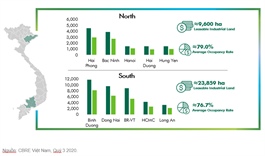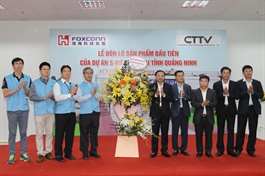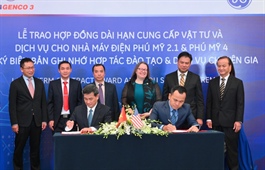The path for digital business in Vietnam
The path for digital business in Vietnam
Digital transformation is taking place across industries in Vietnam, with more enterprises succeeding in this journey. Truong Gia Binh, chairman of FPT Corporation and president of the Vietnam Software and IT Services Association, talked to VIR’s Bich Thuy about the latest trends and how the EU-Vietnam Free Trade Agreement is accelerating the movement amid stiffening competition.
The government is pushing for digital transformation among businesses. How do you evaluate the process amid the global health crisis?

Truong Gia Binh, chairman of FPT Corporation and president of the Vietnam Software and IT Services Association
|
We have seen some positive signals. Suffering from a number of negative impacts from COVID-19, Vietnamese companies are aware that digital transformation is the only way for them to stand firm and develop. They have joined the trend quite speedily as a result.
For example, digital transformation will help Minh Phu Seafood Co., Ltd. to increase their world’s shrimp export market significantly. Similarly, AA Corporation is digitalising its manufacturing and business government system, while the woodwork industry is doing the same.
Some other powerful groups in Vietnam have been building digital transformation strategies on their own. In the banking sector, they have completed consultancy in digital transformation, with development of digital banking being among the keys.
The EU-Vietnam Free Trade Agreement (EVFTA) went into effect over three months ago. How have members of the Vietnam Software and IT Services Association (Vinasa) benefited from this deal?
Amid global economic slowdown, Vietnam is one among the very few countries that is reporting positive growth. This brings about huge opportunities for sectors, including agriculture, which is developing significantly. What we need to do is to fast-track the procedures for imports and exports.
Vinasa and the Vietnam Digital Agriculture Association are working on establishment of the logistic solution to help deal with the transportation services for farm produce to ensure food safety and quality, competitive prices, and reduce on-road losses. The enforcement of the EVFTA prompts Vietnam to renovate its policies on imports and exports, custom clearance, and payments. To this end, digital transformation plays a key role.
Minh Phu Seafood is a pioneer in this, and many are following. To help our members on this path, we have held some workshops on this topic. Vietnam has rich human resources in the IT industry with one million people which is probably equal to that in Japan. So the Southeast Asian country is capable of solving their technology-related issues.
The digital economy is a challenge for the EU and Vietnam as well. Compared to the US and other countries, the EU still lags behind in digital transformation. Therefore, the cooperation between Vietnam and the EU in the agreement will benefit both sides.
The majority of Vietnamese firms are small- and medium-sized enterprises (SMEs) that may be weak in IT application. What should they focus on to become a success?
Now more than ever, SMEs need to boost sales and cut costs. To deal with this, digital transformation is the optimal solution.
International lessons show that to develop into a digital business, SMEs need to replace their traditional IT systems with a new one, and this transformation takes a long time, but the application of new digital products will help them accelerate the process. And development of made-in-Vietnam digital platforms and products would better serve their own needs and then enrich their real-time experience.
What competition in the tech market do you foresee, and what are the opportunities for Vietnamese players?
IT giants would find it difficult to compete with Vietnamese firms when the latter is strong enough. And now many Vietnamese tech firms are expanding globally in a strong way.
For instance, FPT Corporation, the largest IT service company in Vietnam, is able to win many big contracts worth over $100 million in many different countries.
At home, Vietnamese tech firms have more advantages than international players in terms of culture and language, price, and business practices, among others. Meanwhile, those same factors are barriers for foreign companies. Finally, competition will focus on human resources. Many international groups have opened research and development centres in Vietnam to develop digital products there and use the local workforce.






















